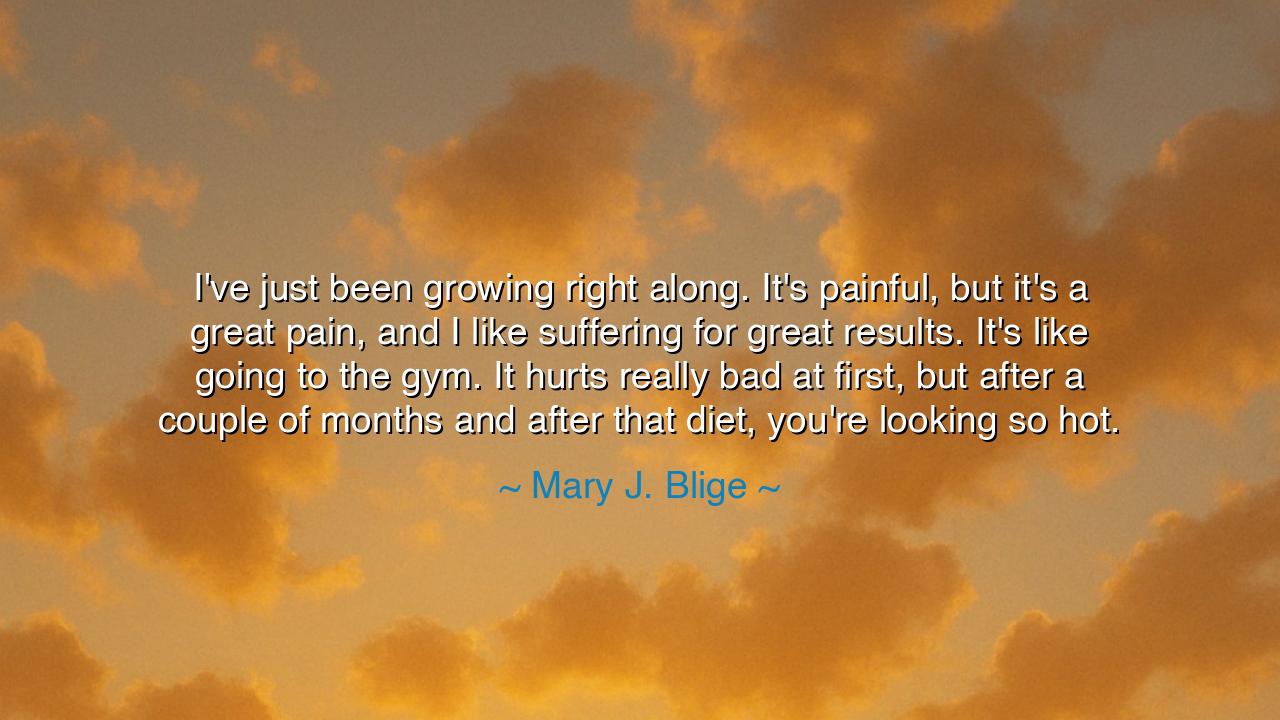
I've just been growing right along. It's painful, but it's a
I've just been growing right along. It's painful, but it's a great pain, and I like suffering for great results. It's like going to the gym. It hurts really bad at first, but after a couple of months and after that diet, you're looking so hot.






When Mary J. Blige said, “I’ve just been growing right along. It’s painful, but it’s a great pain, and I like suffering for great results. It’s like going to the gym. It hurts really bad at first, but after a couple of months and after that diet, you’re looking so hot,” she was not speaking merely of physical transformation—she was unveiling the sacred truth of growth. Her words echo an ancient understanding: that all progress worth attaining demands struggle, and that pain, when embraced with purpose, becomes the midwife of greatness. Hers is the voice of one who has walked through the fire of transformation and emerged not broken, but tempered like steel.
The ancients understood this mystery well. They believed that suffering, when borne with awareness, was not punishment but purification. Heraclitus, the philosopher of fire, taught that “character is destiny” and that the soul is refined through conflict. Just as metal must pass through flame to become strong, so must the human heart endure trials to achieve wisdom. When Blige compares her growth to “going to the gym,” she gives this truth a modern form. The body strains, tears, and rebuilds itself stronger—just as the spirit does when confronted by life’s burdens. The soreness of the muscle mirrors the ache of the soul after deep change: both are signs not of weakness, but of becoming.
Her words also reveal an attitude of reverence toward pain—a willingness to face it not as an enemy, but as a teacher. “It’s painful, but it’s a great pain,” she says. This is the paradox of wisdom. The ancients called this noble endurance pathei mathos—learning through suffering. To despise hardship is to despise the very process of creation. The sculptor must strike the marble; the seed must split the earth; the dawn must break the night. So too must the soul endure its own chiseling, its own hunger, to emerge radiant and whole. In this, Blige speaks with the spirit of a philosopher, cloaked in the language of a survivor.
Consider the tale of Prometheus, who stole fire from the gods and gave it to humankind. For his defiance, he was chained to a mountain, his liver devoured each day by an eagle. Yet from his torment came light for the world—the fire that gave rise to civilization. So too does Blige’s metaphor remind us that the fire of growth burns, yet it illuminates. To “suffer for great results” is to partake in that Promethean courage—to sacrifice comfort for creation, to trade ease for enlightenment. Every person who seeks transformation must, at some point, bear their own Promethean chain.
Her comparison to the gym and diet holds deeper meaning than it seems. The body that endures the pain of training is a metaphor for the spirit under discipline. Each repetition, each sacrifice of indulgence, builds a resilience unseen but deeply felt. The ancients would have called this askesis—a word that meant both physical and spiritual training. The athlete and the philosopher shared the same creed: that mastery requires discipline, endurance, and vision. The body trained through resistance becomes strong; the mind trained through challenge becomes wise; and the heart trained through pain becomes compassionate.
There is also, within her words, the promise of hope. “After a couple of months… you’re looking so hot.” This is not mere vanity; it is the recognition that perseverance bears fruit. The ancients told of the phoenix, the immortal bird that perishes in flames only to rise renewed from its ashes. Growth, too, is a phoenix’s fire—pain first, beauty after. The “great pain” she speaks of is the burning away of the old self, the breaking of habits, fears, and illusions. What emerges after that trial is the self refined—the self that shines.
The lesson of Mary J. Blige’s words is simple but profound: Do not flee from the pain that comes with progress. Welcome it, for it is the sign that you are alive, that you are changing, that something sacred is stirring within you. Let your struggles be your training ground, your heartbreaks your discipline, your perseverance your proof. The ancients would tell you, as she does now, that the path to greatness is not smooth—it is carved with effort and sweat. The joy lies not in avoiding the pain, but in transforming it into strength and radiance.
So remember this truth: every ache of the heart, every trial of the mind, every hardship endured with faith, is your gym of the soul. Do not curse the fire that burns you—it is forging you. Do not fear the hunger that drives you—it is refining you. For as Mary J. Blige reminds us, the reward of endurance is not just the beauty of the result, but the glory of becoming the kind of person who can endure at all.






AAdministratorAdministrator
Welcome, honored guests. Please leave a comment, we will respond soon